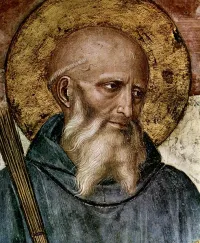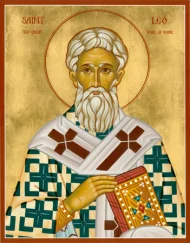 Following Eastertide, which culminates with the feast of Pentecost, the liturgy foresees these three solemnities of the Lord…:
Following Eastertide, which culminates with the feast of Pentecost, the liturgy foresees these three solemnities of the Lord…:
the Most Holy Trinity; on Thursday, that of Corpus Domini, which, in many countries, Italy among them, is celebrated next Sunday; finally, on Friday in two weeks, the feast of the Sacred Heart of Jesus.
Each one of these liturgical observances manifests a perspective from which the whole mystery of the Christian faith is embraced:
respectively, the reality of God one and three, the sacrament of the Eucharist and the divine-human center of the Person of Christ.
They are in truth aspects of the one mystery of salvation, which, in a certain sense, summarize the whole path of the revelation of Jesus, from the incarnation to the death and resurrection to the ascension and the gift of the Holy Spirit.
Today we contemplate the Most Holy Trinity as it was made know to us by Jesus.
He revealed to us that God is love “not in the unity of a single person, but in the Trinity of a single substance” (Preface):
the Trinity is Creator and merciful Father; Only Begotten Son, eternal Wisdom incarnate, dead and risen for us; it is finally the Holy Spirit, who moves everything, cosmos and history, toward the final recapitulation.
Three Persons who are one God because the Father is love, the Son is love, the Spirit is love. God is love and only love, most pure, infinite and eternal love.
The Trinity does not live in a splendid solitude, but is rather inexhaustible font of life that unceasingly gives itself and communicates itself.
[…] All comes from love, tends toward love, and is moved by love, naturally, according to different grades of consciousness and freedom: “O Lord, our Lord, how wondrous is your name over all the earth!” (Psalm 8:2)….
[…] “In him,” St. Paul says, on the Areopagus in Athens, “we live and move and have our being” (Acts 17:28).
The strongest proof that we are made in the image of the Trinity is this: only love makes us happy, because we live in relation, and we live to love and be loved.
[…] The Virgin Mary, in her docile humility, made herself the handmaid of divine Love: she accepted the will of the Father and conceived the Son by the work of the Holy Spirit.
In her omnipotence made a temple worthy of himself, and made her the model and image of the Church, mystery and house of communion for all men.
May Mary, mirror of the Most Holy Trinity, help us to grow in the faith of the Trinitarian mystery.
Benedict XVI (b. 1927): Trinity Sunday Angelus Address, June 7th, 2009 (translation by Zenit).








